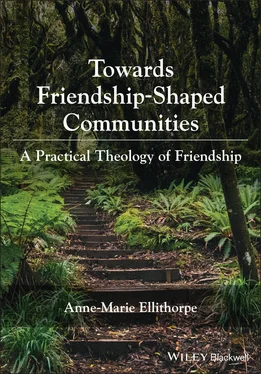These definitions focus predominantly on personal relationships. Friendship has also been recognized as relevant to how we live together in community, and as providing a model for civic relationships. This is evident in the writings of Pope Francis and contemporary political philosophers, as well as philosophers of antiquity. In Fratelli tutti , Francis advocates for social friendship , the love capable of transcending borders. 6 Social friendship calls for the recognition of the worth of every person, regardless of time or context, and makes possible true universal openness. 7 Social friendship is also called for by Southern Africa’s concept of ubuntu, with its acknowledgement that “a person is a person through other persons” or “I am because we are.” 8
Aristotle and others speak of civic or political friendship ( politikē philia ). Some contemporary writers use this term narrowly, focusing predominantly on politics in the context of government. Others use it more broadly. For political philosopher Sibyl Schwarzenbach, civic friendship is “that form of friendship whose traits operate via a society’s constitution, its public set of laws, its major institutions and social customs.” 9 My understanding of civic friendship reflects this broader, systems-level use and is influenced by Danielle Allen’s encouragement for us all to recognize ourselves as implicitly “founders of institutions,” as we affect the shape of life in our communities. 10 Whereas personal friendship is characterized by affection and by both willing good and doing good for the friend, civic friendship is characterized by affection and by both willing good and doing good for the broader community.
In short, friendship has been understood in a variety of ways over the centuries. Variations tend to reflect some of the key changes and challenges of particular times and places. They also reflect diverse approaches to friendship. Anthropological, sociological, philosophical, and theological approaches will be further considered in this and subsequent chapters.
Is Friendship Essential or Peripheral to Being Human?
Currently, friendship is treated as essential for children and optimal for the aged but given relatively little attention in the in-between years. It attracts minimal consideration within the church, academy, and workplace, or within the provision of social services. In religious contexts, friendship is rarely recognized as a virtue or personal discipline, integral to human flourishing. In the academy, friendship has been ignored or disdained as a focus for research. In the workplace, friendship is often regarded as a distraction. In some situations, friendship is recognized as unnecessary and even subversive. Within various environments, people relate to others primarily as clients, workers, consumers, and attendees rather than as friends. 11 There seem to be few contexts where having deep friendships is regarded as the most essential thing for human beings.
Anthropologists have focused on kinship, neglecting the sometimes-overlapping concept of friendship. When friendship has been studied, the focus has been primarily on formal relationships with well-defined mutual obligations, including kinship, trade, and working relationships. Most of these studies have focused on male friendships and disregarded friendships between females. 12 Nevertheless, in the early twentieth century the study of friendship emerged as a research field within anthropology, challenging the previous dominance of kinship studies. 13 As anthropologists have begun to take up the topic of friendship in their work, they have identified friendship as a highly flexible social phenomenon and advocated for contextualized studies. 14
Anthropologists who have considered friendship include Agnes Brandt and John Terrell. Brandt engaged in ethnographic fieldwork within Aotearoa New Zealand in order to “uncover the everyday construction of friendship in different socio-cultural contexts.” 15 Her exploration of friendship worlds features within Chapter 2. Brandt observes that friendship has been regarded as a “social phenomenon of modernity.” 16 This is somewhat ironic, given that contemporary theories of friendship are typically informed by Western-European traditions of thought, beginning with the writings of ancient Greeks and Romans. Furthermore, John Terrell’s observations suggest otherwise.
In A Talent for Friendship , Terrell begins by asking “What does it mean to be human?” 17 He considers “what are most of us capable of doing?” rather than “what does everyone everywhere do?” 18 Terrell did not specifically set out to research friendship. Nevertheless, his research has convinced him that the human capacity to make friends even with strangers is a defining characteristic of our species, marking us apart from (most) other species on earth. 19
Terrell discovered that in places near and far along the Sepik coast of Papua New Guinea, there is a longstanding tradition of inheriting friends, generation after generation. 20 The custom of inheriting friendships with families in other communities contributes significantly to the maintenance of social and cultural stability in one of the more environmentally challenging places in the world. Terrell’s observation that this practice helped sustain a way of life prompted him and his co-researcher to take a much closer look at what it means to be a friend.
Terrell observes an interplay between questioning conventional wisdom about friendship and contesting conventional wisdom about human nature. 21 His observations and assertions are in stark contrast with the perception that friendship is a social phenomenon of modernity. However, Terrell speaks somewhat disparagingly of “ghost ideas” about human nature inherited from an Enlightenment-era reading of the book of Genesis. 22 He asserts that the basic unit of human society is the individual and her social relationships with others, rather than the individual (and perhaps a helpmate). 23 Is Terrell correct that friendship is innate to what it means to be human? Further, is he correct in considering this to be counter to the creation accounts of Genesis? Is this an area in which the Christian tradition needs correction? These are questions to which we will return in Chapter 6.
What Is Friendship in Our Social World?
Friendship in our contemporary world is typically assumed as a sociological fact, and not particularly well-attended to. Until recently, friendship was considered unimportant relative to the key issues that characterized the comparatively young discipline of sociology. Friendship was discussed, however, by Georg Simmel, a German sociologist. Writing before the Great War, Simmel asserted that modernity is inevitably destructive of friendship, at least in the sense used in classical debates. Simmel was an admirer of friendship; he considered it to be the “purest, most transparent, most engaging form of interaction.” 24 Yet as a play form of sociability, friendship was relegated to the private sphere. Simmel considered that modern people had too much to hide for friendship in the ancient sense to be possible. Rather, they were inclined towards differentiated friendships, where sympathy might bind them to one person, intellectual community to another, religion to a third, and common experiences to a fourth. 25 This differentiation presented challenges when it came to self-revelation and self-concealment, with friends reciprocally refraining from “obtruding themselves” into those “interests and feelings” not included in their own relationship with a friend. 26
Subsequently, while sociological literature drew attention to the potential harm of social isolation and disconnection, concern typically focused on family and community organization. 27 Friendship was increasingly seen as a private relationship and a play form of sociability. Overall, the importance of friendship was disregarded amongst social scientists, until the late twentieth century. Within sociology, friendship was considered (at best) to be of short-lived importance compared with other life issues such as family and work. 28
Читать дальше












